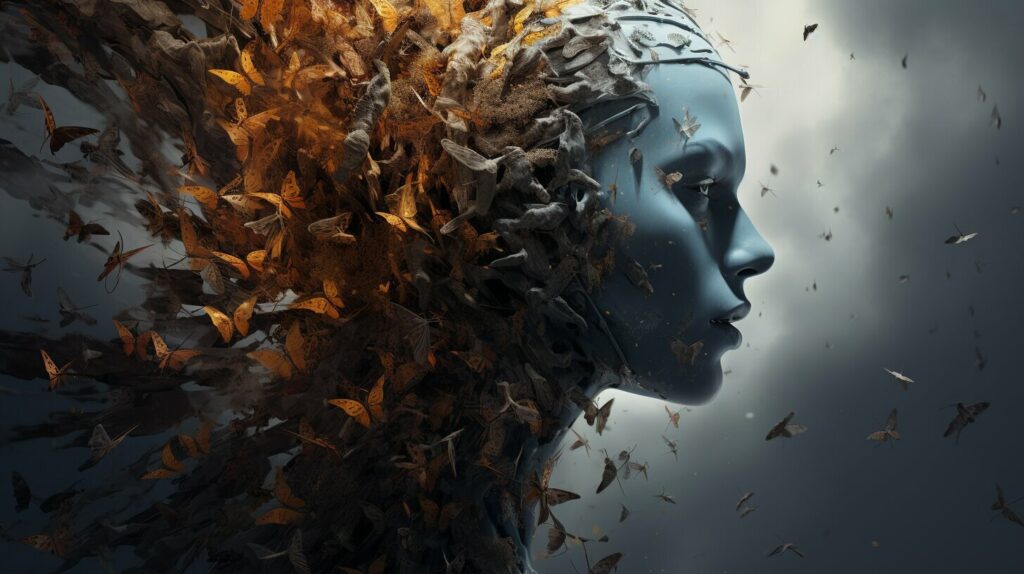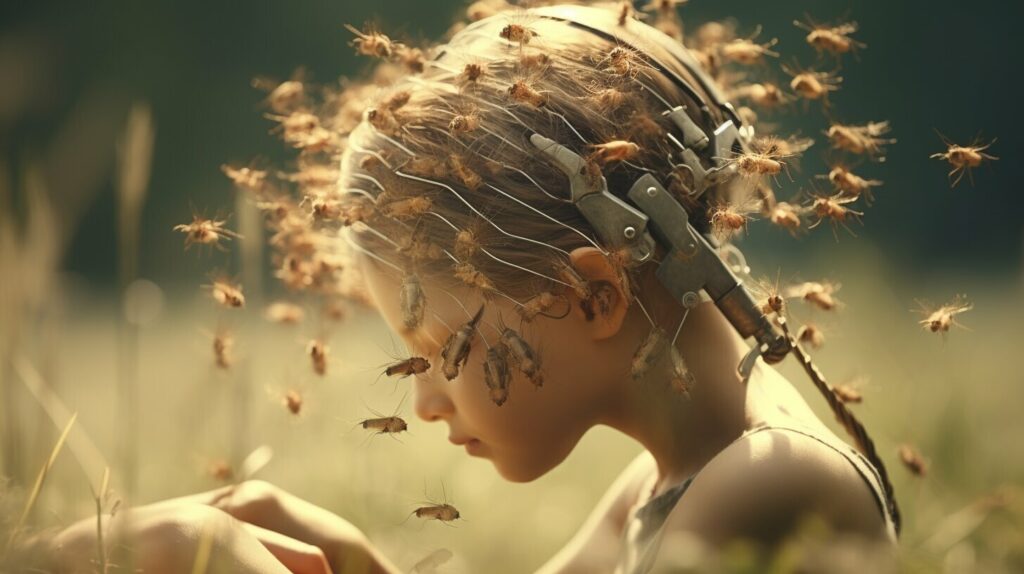Do you often dream about bugs or insects? It can be unsettling to wake up from a dream filled with creepy crawlers, but these dreams may hold significant meaning. Dreams have long been considered a window into our subconscious minds, and bug dreams are no exception. By analyzing the symbolism and emotions in these dreams, you can unlock hidden messages from your psyche.
In this article, we will explore the symbolic significance of bugs in dreams and offer tips for interpreting their meaning. We will also discuss different types of bug dreams, common emotions associated with them, and factors that can influence their symbolism. Whether you’re creeped out by bugs or fascinated by them, these dreams provide valuable insights into your innermost thoughts and feelings.
Key Takeaways:
- Dreams about bugs can hold significant meaning and offer insights into your subconscious thoughts and emotions.
- Understanding the symbolic meaning of bugs in dreams can help you decipher the messages behind your dream.
- Common emotions associated with bug dreams can offer clues to the underlying meaning of the dream.
- Personal experiences and cultural beliefs can influence the symbolism of bug dreams.
- By analyzing bug dreams in relation to your waking life, you can gain deeper insights into yourself.
Understanding the Symbolic Meaning of Bugs in Dreams
When it comes to dreams about bugs, the symbolic meaning can vary depending on the type of insect featured. In general, bugs are often associated with negative or uncomfortable feelings such as fear, disgust, or annoyance. However, these dreams can have deeper meanings and offer valuable insights into your subconscious mind.
Ants, for example, are often interpreted as representing hard work and diligence. Seeing an ant colony in your dream may suggest that you need to focus on productivity or teamwork. On the other hand, spiders are often associated with creativity or feminine power. If you dream of a spider spinning a web, it may symbolize a desire to create something new or to tap into your creative potential.
Meanwhile, dreams of bees or wasps are often connected with themes of communication or aggression. If you dream of being stung by a bee, it may indicate a need to speak up or defend yourself. Dreams of moths or butterflies can represent transformation or growth, as these insects undergo significant changes throughout their life cycles.
It’s important to note that the symbolic meaning of bugs in dreams can vary depending on your own personal experiences and beliefs. For example, if you have a strong fear of spiders, your dreams may reflect this fear in a more intense way.
Understanding the Symbolic Meaning of Bugs in Dreams: Key Points
- Bugs in dreams can have symbolic meanings related to the type of insect featured
- Ants can symbolize hard work and diligence
- Spiders can represent creativity or feminine power
- Bees or wasps may be connected with communication or aggression
- Moths or butterflies can represent transformation or growth
- Personal experiences and beliefs can influence the symbolic meaning of bug dreams
Different Types of Bug Dreams and Their Interpretations
Now that you understand the symbolic meaning of bugs in dreams, let’s look at different types of bug dreams and their interpretations. These insights may help you understand the underlying messages of your own bug dreams.
Dreams of Swarming Ants
If you dream of swarming ants, it may represent a feeling of being overwhelmed or surrounded by small problems. Alternatively, it could symbolize a need for teamwork or a sense of community.
Dreams of Spiders
Dreams of spiders often represent fear, anxiety, or a sense of being trapped. However, they can also signify creativity, patience, and resourcefulness.
Dreams of Bees
Bees in dreams can symbolize productivity, hard work, and collaboration. Alternatively, they may represent a feeling of being stung or hurt by someone close to you.
Dreams of Cockroaches
Cockroaches in dreams often represent a fear of disease, uncleanliness, or decay. They may also indicate feelings of shame or embarrassment.
Dreams of Butterflies
Butterflies in dreams can signify growth, transformation, and beauty. They may also represent a sense of freedom or lightness.
Of course, the interpretations of bug dreams can vary depending on the individual dreamer and the context of the dream. Consider your own emotions and experiences when analyzing your bug dreams to gain a deeper understanding of their significance.
Common Emotions Associated with Bug Dreams
When it comes to dreams about bugs, it’s common to experience a range of emotions, from fear and disgust to fascination and curiosity. These emotions can offer valuable insight into the significance of the dream.
If you feel fear in your bug dream, it may suggest that you are facing anxieties or insecurities in your waking life. Consider what these fears may be and how you can confront and overcome them.
On the other hand, if you feel fascination or curiosity in your bug dream, it may symbolize your desire to explore new opportunities or gain a deeper understanding of yourself. Take this as an invitation to pursue your passions and interests.
Meanwhile, disgust or discomfort in a bug dream may indicate that you are grappling with feelings of shame or guilt. It’s important to acknowledge and address these emotions in order to move forward and find peace within yourself.
Factors That Influence Bug Dreams
Your dreams about bugs can be influenced by many factors, both internal and external. Understanding these factors can be key to interpreting the meaning of your dreams.
Personal Experiences:
Your past experiences, both positive and negative, can impact your dreams about bugs. For example, if you were stung by a bee as a child, you may have recurring dreams of being chased by bees. Similarly, positive experiences, such as playing with ladybugs, can lead to dreams about these insects.
Cultural Beliefs:
Cultural beliefs and superstitions can also shape the meaning of your bug dreams. In some cultures, seeing certain insects is considered a good omen, while in others, it is a bad sign. Your upbringing and exposure to different cultures can affect the way you interpret bug dreams.
Emotional State:
Your emotional state can also impact the meaning of your bug dreams. For example, if you are feeling anxious or stressed, you may have dreams about swarms of insects or spiders. Alternatively, if you are feeling confident and empowered, you may dream about being in control of insects.
Environmental Factors:
Environmental factors, such as weather and location, can also influence your bug dreams. For example, if you live in an area with a high mosquito population, you may have dreams about being bitten by mosquitoes. Similarly, if you are camping or hiking in the woods, you may dream about encountering bugs in the wilderness.
By considering these factors, you can gain a deeper understanding of your bug dreams and uncover their hidden meanings. Keeping a dream journal and reflecting on your waking life can also help you make connections between your dreams and your daily experiences.
Analyzing Bug Dreams in Relation to Your Life
When interpreting your bug dreams, it’s important to analyze them in relation to your waking life. This means considering your personal experiences, emotions, and thoughts that may be influencing the dream.
Start by examining the context of the dream. Where were you in the dream? What were you doing? Who else was present? These details can provide insight into the areas of your life that the dream is addressing.
Next, pay attention to the emotions you experienced in the dream. Did you feel scared, disgusted, or fascinated? These emotions can offer clues to the underlying messages of the dream. For example, if you felt scared in the dream, it may suggest that you are feeling anxious or fearful in your waking life.
It’s also important to consider any recurring themes or patterns in your bug dreams. Do you often dream about spiders or ants? These patterns may be indicative of deeper issues or patterns in your life that need addressing.
Analyzing Your Subconscious Thoughts and Feelings
By analyzing your bug dreams in relation to your life, you can gain insight into your subconscious thoughts and feelings. For example, a dream about being swarmed by bees may symbolize feeling overwhelmed or out of control in your waking life.
Consider the specific type of bug in the dream and its symbolic meaning. A dream about a butterfly may represent transformation or growth, while a dream about a cockroach may represent uncleanliness or negativity.
Ultimately, the key to interpreting bug dreams is to remain open and curious. Trust your instincts and reflect on the messages that these dreams may be trying to communicate to you. With practice and attention, you can become more attuned to your subconscious mind and gain deeper insights into yourself.
Tips for Interpreting Bug Dreams
If you’re interested in interpreting your bug dreams, here are a few tips to guide you:
- Keep a dream journal: Writing down your dreams immediately after waking up can help you remember the details and emotions associated with the dream. This can provide valuable insights when analyzing the dream later on.
- Consider the context: The setting, people, and events in the dream can all influence the meaning of the bugs. Try to recall and examine these details when interpreting the dream.
- Explore your emotions: The emotions you feel in the dream can be a reflection of your subconscious thoughts and feelings. Analyze why you feel a certain way toward the bugs in the dream.
- Look up symbolism: Different types of bugs can represent various things, such as transformation, persistence, or danger. Look up the symbolic meanings of the bugs in your dream to gain further insight.
- Reflect on your waking life: Try to connect the symbols and events in the dream to your current waking life. Is there anything happening or any emotions you are experiencing that relate to the dream?
- Consider seeking professional help: If you’re struggling to interpret your dreams or want a deeper analysis, a therapist or dream interpreter may be able to offer valuable insights.
By following these tips and exploring your subconscious mind, you can unlock the hidden messages behind your bug dreams and gain a deeper understanding of your inner self.
Psychological Perspectives on Bug Dreams
If you’re interested in exploring the psychological underpinnings of your bug dreams, it’s worth considering two of the most renowned psychologists of the last century: Carl Jung and Sigmund Freud.
Jung believed that dreams, including those about insects, could reveal important insights into the deepest parts of our psyche. He suggested that dreams are a way of communicating with our unconscious mind, and that the images and symbols that appear in dreams are manifestations of our deepest desires and fears.
Freud, on the other hand, saw dreams as a way of expressing repressed sexual or aggressive instincts. He believed that the images and symbols that appear in dreams are often highly symbolic representations of our underlying desires and fears, and that by interpreting these symbols we can gain insight into our unconscious mind.
Both of these psychologists believed that dreams about bugs could be highly significant. For Jung, insects were often symbolic of transformation and change, while for Freud they could represent the primal instincts and desires that we often suppress in our waking lives.
Of course, these are just two of the many theories that have been proposed over the years. Ultimately, the interpretation of your bug dreams will depend on your own personal beliefs and experiences.
Cultural and Historical Views on Bug Dreams
Throughout history, different cultures have had varying interpretations of bug dreams. In ancient Egypt, beetles were symbols of transformation and rebirth. Meanwhile, in Japan, cicadas were viewed as symbols of resurrection and immortality. In Native American cultures, dreams about spiders were considered sacred and represented creativity and feminine energy.
Similarly, in modern times, some people believe that bug dreams can be interpreted as omens or warnings. For instance, in some cultures, dreaming about bees could indicate an upcoming financial windfall, while dreaming about lice could signal an impending health problem.
It is important to remember, however, that cultural beliefs and superstitions should not be taken as definitive interpretations of bug dreams. Rather, they should be considered alongside personal experiences and emotions when interpreting the meaning behind these dreams.
Interpreting Cultural and Historical Views on Bug Dreams
When interpreting bug dreams from a cultural or historical perspective, it is crucial to consider the specific symbols and meanings associated with the insect in question. For example, if you dream about a beetle, research its cultural significance in ancient Egypt or other societies to gain a deeper understanding of the potential messages behind your dream.
Additionally, it can be helpful to reflect on your own cultural background and beliefs to understand how they may be influencing the way you interpret your dreams. For instance, if you were raised in a culture where spiders are considered unlucky, this may influence your interpretation of a spider dream.
Overall, while cultural and historical views on bug dreams can provide useful insight, it is important to approach interpretation with a critical and open-minded perspective.
The Healing Power of Bug Dreams
Despite the unsettling nature of bug dreams, they have the potential to offer therapeutic benefits and help you grow personally. By understanding the underlying messages and symbolism, you can use these dreams to gain insight into your subconscious mind.
One way to use bug dreams for healing is to confront any fears or anxieties they may represent. By acknowledging and facing your fears in a safe environment like a dream, you can begin to overcome them in your waking life.
Bug dreams can also serve as a tool for self-reflection. By examining the emotions and context of the dream, you can gain a deeper understanding of your thoughts and feelings. This can lead to greater self-awareness and personal growth.
Finally, discussing your bug dreams with a therapist or trusted friend can offer further healing benefits. By verbalizing your thoughts and feelings, you can gain new perspectives and receive support in processing any difficult emotions.
Conclusion
Congratulations! You have completed the journey of decoding your dreams about bugs. By understanding the symbolic meaning and interpreting various types of bug dreams, you have gained insight into your subconscious mind and unlocked hidden messages.
Remember, the common emotions associated with bug dreams and the factors that influence them can offer important clues to their meanings. By analyzing your bug dreams in relation to your waking life, you can gain deeper insights into your thoughts and feelings.
Don’t forget to use the practical tips provided in this article to continue deciphering the messages in your dreams. And if you need further assistance, seeking the help of a professional can be beneficial.
Finally, embrace the healing power of bug dreams. Despite their unsettling nature, these dreams can offer therapeutic benefits and serve as tools for personal growth and self-reflection.
Thank you for taking the time to explore the significance of dreams about bugs. May your future dreams offer you valuable insights and bring you closer to understanding your true self.
Related Articles
FAQ
Q: What do dreams about bugs mean?
A: Dreams about bugs can hold significant meaning and provide insights into your subconscious mind. By analyzing the symbolic representations and your emotions in the dream, you can decode the messages hidden within.
Q: How do I interpret dreams about bugs?
A: To interpret dreams about bugs, it is important to understand the symbolic meaning of different types of insects. Each bug may reflect different aspects of your life or personality. By analyzing the context and emotions surrounding the dream, you can gain deeper insights into its interpretation.
Q: What are common emotions associated with bug dreams?
A: Bug dreams can evoke a range of emotions such as fear, disgust, fascination, or curiosity. These emotions can offer clues to the underlying messages and significance of the dream.
Q: What factors influence bug dreams?
A: Various factors can influence bug dreams, including personal experiences, cultural beliefs, and subconscious thoughts and feelings. These factors shape the symbolism and meaning of the dreams.
Q: How can I analyze bug dreams in relation to my waking life?
A: To analyze bug dreams in relation to your waking life, consider the context of the dream and the emotions you experienced. Reflect on any connections or similarities between the dream and your current situation or emotions. This can offer insights into your subconscious thoughts and feelings.
Q: What are some tips for interpreting bug dreams?
A: Some tips for interpreting bug dreams include keeping a dream journal, exploring personal associations with bugs, seeking professional help if needed, and considering different perspectives and theories from renowned psychologists. These tips can assist you in uncovering the true meaning behind your dreams.
Q: What are the psychological perspectives on bug dreams?
A: Psychologists such as Carl Jung and Sigmund Freud have explored the psychological perspectives on bug dreams. Their theories provide further understanding of the potential meanings and symbolism behind these dreams.
Q: How have different cultures and time periods interpreted bug dreams?
A: Bug dreams have been interpreted differently across various cultures and time periods. From ancient beliefs to modern superstitions, exploring cultural and historical views can offer insights into how bug dreams have been understood and their significance in different societies.
Q: Can bug dreams have a healing power?
A: Despite their unsettling nature, bug dreams can have a healing power. By exploring the messages and symbolism behind these dreams, they can offer therapeutic benefits and serve as tools for personal growth and self-reflection.



